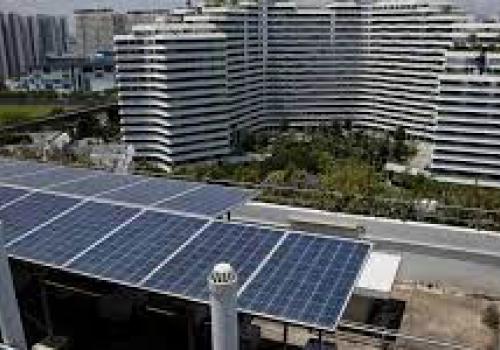Singapore is buying hydropower generated in Laos, the first step in the tiny country's ambitious plan to import renewable energy that it has little space to produce at home. Keppel Electric, part of state-backed conglomerate Keppel and the first recipient of a new government license for electricity imports, in June started importing hydroelectric power from Electricite du Laos. The company will bring in up to 100 megawatts during the two-year pilot phase, with full-scale commercial operation to follow. Singapore aims to achieve net-zero carbon emissions by or around 2050, but its small size and location make it a poor fit for wind, geothermal and hydroelectric generation. Big solar farms are not a feasible option, and rooftop solar panels can generate only so much energy. So Singapore -- which relies on imports for much of its water supply -- has cast a wider net for power. Singapore's energy import plans extend as far away as Australia. Australian startup Sun Cable aims to build a multi-gigawatt solar farm on 12,000 hectares in the northern Australian desert. The power would be exported to Singapore via a 4,200-kilometer undersea cable. The project, which has tapped Macquarie Capital as a fundraising adviser, is expected to cost more than 30 billion Australian dollars ($21 billion). Sun Cable plans to break ground in 2024, targeting full operation by 2029. Singapore relies on natural gas for 95% of its electricity, a dependence that left the country exposed when natural gas prices soared after Russia's invasion of Ukraine. Just 3.2% of its power comes from renewable sources.
Singapore in October set a target of importing 4 gigawatts of low-carbon electricity by 2035, or 30% of the country's estimated total supply that year. It set up a license system and began soliciting proposals from the private sector, receiving applications from more than 20 companies including domestic energy group Sembcorp Industries as well as Western and Chinese businesses. The Laos deal could promote electricity sharing among countries in a region slow to adopt the practice. Laos began exporting energy to Thailand and Malaysia along with Singapore only recently. Europe has been a pioneer in cross-border electricity sharing, while Southeast Asia -- where even domestic power grids are underdeveloped in some areas -- has lagged. Laos's agreements with countries such as Thailand are purely bilateral, and often are less about sharing than about buyers investing in infrastructure to generate power for their use. Having exports as an option to sell excess power could make investments in around-the-clock sources of renewable energy, such as wind, geothermal and tidal power, more appealing. But Singapore's plan prompts concern that the city-state, which already depends on Malaysia for much of its water, will end up relying on foreign suppliers for another vital lifeline.
Malaysia and Indonesia have hit the brakes on export plans, prioritizing domestic energy supplies. Malaysia's YTL PowerSeraya, a Singapore-based power company owned by Malaysian conglomerate YTL Corporation, was slated to start an export trial run in early 2022, but the plan was postponed. Solar company EDPR Sunseap, majority owned by Portuguese EDP Renewables, has signed a memorandum of understanding with Indonesia's Riau Islands province to build an offshore solar farm to supply power there as well as to Singapore, but work has yet to begin. Though Sunseap says it has support from the governments of Indonesia and Singapore, the plan still needs Indonesia's approval. "Most ASEAN countries have domestic demand for renewable power of their own [except for Laos, which is eager to export its excess hydro-generated power]. As Indonesia and Malaysia have demonstrated, export opportunities to Singapore need to be weighed against local needs," said Norman Waite, an analyst at the Institute for Energy Economics and Financial Analysis. "It is worth remembering that clean energy imported to Singapore counts toward Singapore's decarbonization goals, not toward those of the exporting country," he added.
